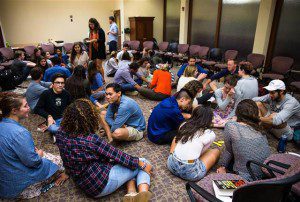 I just wrote a piece for The Federalist on a sex seminar at Colgate University on “consent” in sexual relationships. The event brought students together for late-night discussion of their sexual predilections, which the organizers encouraged with just one moral guideline: consent.
I just wrote a piece for The Federalist on a sex seminar at Colgate University on “consent” in sexual relationships. The event brought students together for late-night discussion of their sexual predilections, which the organizers encouraged with just one moral guideline: consent.
Here’s a swatch from the piece:
Even as we denounce any kind of sexual misconduct, we must also be very clear: the hookup culture is hugely to blame for these encounters gone awry. Schools like Colgate have abdicated moral instruction of their students and encouraged them to foster sexual desire. This is what NBC reported: “As students detailed their preferences and fantasies that Wednesday night, the room was thick with sexual tension. Hawkins said people constantly tell her all they want to do afterwards is go home and have sex. ‘And they don’t want to just have sex,’ she said. ‘They want to have good sex.’” Of course they do. By highlighting this program on the college website, Colgate seems to want them to, as well.
Read the whole thing over at The Federalist.
This extracurricular program at Colgate, enthusiastically noted by the school, is training students in a sexualized identity. You are your lusts, the seminar is essentially saying. The thing that should consume you and occupy your mind is sex. College students scarcely need more encouragement to think in this direction. Many of them, without any seminar-based pedagogy, have already bought into a sexualized identity. But it’s noteworthy to see a reputable school like Colgate only further stirring the inherent desires of students.
From every angle today, young people are encouraged to make their sexuality the cornerstone of their being. Are you hetero? Homo? Bicurious? Interested in different arrangements? What do you like? What don’t you like? This is a tragic mistake. Sex is not problematic for Christians; God, after all, invented it. But sex is only a part of our lives, by no means the greatest part whatever your natural desires. It is subject to the contours of the divine plan. Sex is a bounded reality, made only for the covenant of marriage.
Let me speak as clearly as I can to readers: you are not your sexuality. The two most important identifiers in this world are this: the image of God, which every person bears, and the cross of Christ, which every Christian loves. God has already defined what it means to be human in the Bible. Our manhood or womanhood is a crucial part of our identity. But even with all the differences between men and women, we share fundamental unity as image-bearers.
Sexual proclivity is part of our identity as men and women, and it is influenced by the fall. We are tempted to make it the most important part of our being. But this is not so. We are an image-bearer; we are a man or a woman; if redeemed, the single most important truth about us is that we are in Christ, and will be into all eternity and beyond.
We are not only sexual beings. Alfred Kinsey, the “scientist” who did the most to enforce the centrality of our sexuality–with a strong assist from Freud–famously rigged his sexual studies, including many who practiced aberrant sexuality and thus allowed for a perverse data set. We are intellectual, moral, spiritual, emotional, psychological. We have a soul, a body, and a mind. We are unified beings, but composed of many parts. Sexuality is one of them.
It is also a temporary reality. It’s tempting to think that we are in our ideal state now. But we are not. As believers, we will live forever with God in what Jonathan Edwards called a “world of love,” the purest love there is. We will participate in the fullest measure in communion with the Godhead. Sex is great and a good gift. We’re not squeamish. But we do not think by a country mile that it is the purpose of our existence or the essence of our identity.
We were made for God. We were made for fellowship. In a blink, our lives will be over. Then, we will rule with Christ in a world made right. That is our destiny, and that–much more than any temptation or predilection–is our identity.















